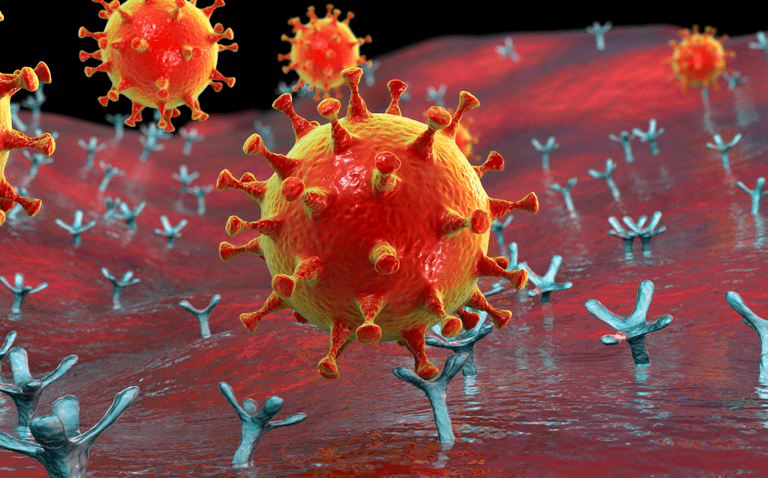An RCT has found that the use of telmisartan failed to improve disease severity among patients hospitalised with COVID-19 compared to placebo
Telmisartan given to patients hospitalised due to COVID-19 but not requiring oxygen, provided no benefit (in terms of improvement in disease severity score) compared to placebo according to the findings of randomised, double-blind, placebo-controlled trial by Australian and Indian researchers.
The COVID-19 virus gains entry into cells via the angiotensin converting enzyme 2 (ACE2) receptor and makes use of the serine protease TMPRSS2 for protein priming. ACE2 is a key regulator of the renin-angiotensin system, responsible for degrading angiotensin II and thereby counteracting its pro-inflammatory effect mediated through the angiotensin II type 1 receptor (ATR1). Consequently, it is possible that blockage of the ATR1) receptor with angiotensin receptor blockers (ARBs) such as telmisartan, may represent a safe, low-cost solution for reducing COVID-19 respiratory outcomes. In fact, a prospective study has already demonstrated that angiotensin converting enzyme inhibitors and ARBs are associated with reduced risks of COVID-19 disease after adjusting for a wide range of variables. However, randomised trials with ARBs to date have been equivocal. For example, one trial using losartan concluded that initiation of the drug to hospitalised COVID-19 patients did not improve the arterial partial pressure of oxygen to fraction of inspired oxygen ratio at 7 days compared to placebo. Furthermore, use of losartan did not reduce hospitalisations among outpatients prescribed the drug. In contrast, a study using telmisartan 80 mg twice daily, among patients hospitalised with COVID-19, showed that the drug reduced C-reactive protein (CRP) plasma levels compared to placebo.
In order to provide more data on the value of ARBs, in the current trial researchers randomised patients hospitalised with COVID-19, 1:1 to either telmisartan 40 mg daily or matching placebo. The primary outcome was COVID-19 disease severity (based on the World Health Organisation (WHO) Clinical Progression Scale) assessed after 14 days. The WHO scale ranges from 1 to 7 with lower scores indicating less severe disease.
Telmisartan and COVID-19 disease severity outcome
A total of 788 participants with a mean age of 49 years (64 % male) were randomised to either telmisartan (393) or placebo. The baseline overall WHO scale score was 3, equating to hospitalised but not requiring oxygen.
At day 14, the WHO score had improved to 1 (i.e., not admitted to hospital and with no activity limitations) in 384 telmisartan patients with 382 assigned to placebo (Odds ratio, OR = 1.51, 95% CI 1.02 – 2.23, p = 0.98). There were also no significant differences when the primary outcome was examined in different subgroups based on gender, co-morbidities or hypertension. In fact, the trial was stopped when a pre-specified futility rule was met.
Based on these findings, the authors concluded that there was no evidence of benefit, based on disease severity score, from the use of telmisartan in hospitalised patients with COVID-19 and who had predominately mild disease.
Citation
Jardine MJ et al. Angiotensin receptor blockers for the treatment of covid-19: pragmatic, adaptive, multicentre, phase 3, randomised controlled trial. BMJ 2022










